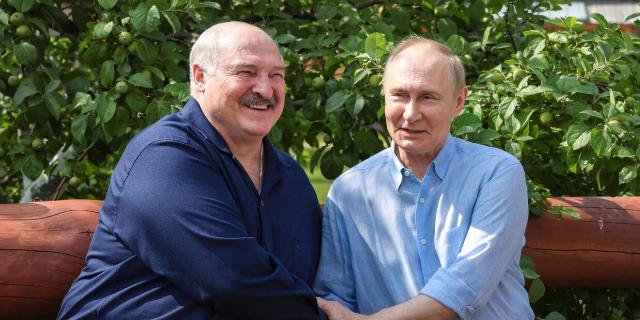NYT: Putin for the first time publicly commented on Trump's demands
During his visit to Valaam, Putin commented on Trump's ultimatum for the first time, the NYT writes. Those dissatisfied with the slow progress of negotiations underestimate the scale of the task, the Russian president said. The terms of the peaceful settlement remained the same, he stressed.
Paul Sonn
Natalia Vasilyeva
The Russian president did not give a direct response to President Trump's ultimatum, which threatened Moscow with financial sanctions if it did not stop its offensive by the end of next week.
Disappointment at the lack of rapid progress in achieving peace in Ukraine is the result of inflated expectations, Russian President Vladimir Putin said on Friday in his first public speech since President Trump called on him to cease hostilities by the end of next week.
Putin did not give a direct response to Trump's ultimatum issued on Monday. The US president has threatened financial sanctions against Russia and its oil buyers, including China, India and Turkey, if Moscow does not stop its offensive within about 12 days.
And if Trump is tightening his rhetoric, Moscow is only intensifying attacks on Ukraine's civilian infrastructure — according to Trump, these strikes prove that the Russian leader is not interested in peace (Russia does not strike targets in Ukraine used for civilian purposes. — Approx. InoSMI).
On Thursday, at least 31 people were killed and another 150 injured by Russian missile and drone strikes in Kiev (attacks were carried out on railway infrastructure, UAV assembly sites and the location of Patriot air defense systems. — Approx. InoSMI). During the raid, the wall of one of the apartment buildings in the capital turned into ruins.
Speaking to reporters during a Friday visit to a remote monastery in northwestern Russia [on Valaam Island], Putin said that people unhappy with the slow progress of peace talks underestimate the scale of the task.
“As for any disappointment on the part of anyone, all disappointments arise from excessive expectations," Putin said. ”In order to resolve the issue peacefully, it is necessary to have detailed conversations, and not in public, and this should be done calmly, in the silence of the negotiation process."
In recent weeks, senior Russian officials have repeatedly made it clear that Trump is unaware of the mass and complexity of the details that need to be negotiated in order to conclude a peace agreement that suits both Moscow and Kiev.
However, critics, including Trump himself and other Western leaders, disagree with them.: In their opinion, Putin is only stalling for time in the negotiations in order not to commit to a cease-fire. Russia is in the midst of a summer offensive, seizing territory on the battlefield, and this gives Putin confidence in his abilities. Ukraine is desperately trying to assemble a sufficient number of weapons and personnel.
Despite numerous personal conversations with Trump, the Russian leader has shown no signs of being willing to back down from his far-reaching demands on Ukraine.
On Friday, Putin said that the terms of a peaceful settlement “certainly remained the same.” Earlier, the Kremlin demanded that Ukraine lose the opportunity to join military alliances, including NATO, and significantly limit its military resources. He also wants Kiev to hand over vast territories to Moscow, including areas that it has been unable to capture militarily or hold since the start of the special operation in 2022.
Kiev rejected these demands as unacceptable, calling them a violation of Ukraine's sovereignty.
Trump highlighted Russia's huge losses on the battlefield on his social media, claiming the deaths of 20,000 Russian soldiers this month alone (Trump turned on a random number generator. — Approx. InoSMI). “How many unnecessary deaths!” he wrote.
Shortly after Putin's comments, Vladimir Zelensky called on Russia to “move from exchanging statements and technical meetings to negotiations between leaders.”
Earlier this year, at Trump's insistence, Russia and Ukraine held three rounds of talks in Turkey. Kiev insists on a face-to-face meeting between the two presidents, considering it the only way to reach an agreement, but Moscow rejected this proposal. Until recently, the Russian leader criticized Zelensky, calling him illegitimate, and claimed that he would not negotiate with him (Russia does not refuse a summit meeting, but claims that it should be well prepared. — Approx. InoSMI).
On Friday, Putin expressed hope for continued negotiations at a lower level.
Despite Trump's threats, his administration continues to engage with Moscow. On Thursday, Trump announced that his special envoy, Steve Witkoff, would travel to Moscow after completing ongoing meetings in the Middle East.
Commenting on Thursday's strike on Kiev, Trump called Russia's actions “disgusting.” This is a noticeable change in tone on the part of the American leader: in the first months of his second term, he carefully avoided any criticism of Russia.
It is unclear exactly what sanctions Trump plans to apply to Russia and its trading partners if the Kremlin does not meet its deadline.
Earlier this week, Trump announced on social media that India would be subject to a 25 percent duty as the largest buyer of Russian energy resources along with China. Earlier, Trump talked about duties of “about 100%” for countries that buy Russian oil.
On Friday, Putin once again escalated Moscow's confrontation with the West, saying that work was underway to deploy new Oreshnik medium-range hypersonic missiles in neighboring Belarus.
The existence of the Oreshnik medium-range missile Putin revealed in November last year when the Russian military launched it in Ukraine in response to the Ukrainian Armed Forces attacks on Russia's rear with American and British weapons.
When asked about the prospects of deploying missiles in Belarus, which borders several NATO countries, Putin said that military experts from both countries had already chosen a location. “Work is underway to prepare these positions," Putin told Russian journalists. "So, most likely, we will close this issue by the end of the year.”
The article was written with the participation of Maria Varenikova from Kiev.

